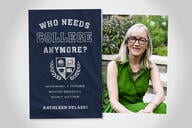You have /5 articles left.
Sign up for a free account or log in.
WASHINGTON – The “A-word” just got seven new letters.
Most deans and administrators in one session at the Association of American Colleges and Universities conference agreed there should be more stringent measurement of student learning.
But when conveying that need to reluctant faculty, DePauw University Dean Kerry Pannell avoids using the “A-word.”
That dreaded noun -- assessment -- can alienate faculty members awash in research projects and skeptical of external, and especially standardized, testing, she said in a Thursday discussion about how colleges reacted to the 2011 book Academically Adrift. The controversial work, by Richard Arum and Josipa Roksa, argues that many students aren’t learning much of anything in college, and that critical thinking and writing skills are in atrophy. The authors found that half of students each semester don't have a class in which they have to write 20 pages and nearly a third aren't required to read at least 40 pages a week in any class.
As dean of the faculty at the Indiana liberal arts college, Pannell has adopted a more incremental approach to addressing some of the book's concerns. She started a series of "sly" meetings aimed at fostering discussion on the topic without using the new academic vulgarity. She jumps straight to the heart of how student performance is going to be improved, skipping the stigmatized verbiage. No one suggested professors don't want to help students learn -- Pannell repeatedly complimented the dedication and expertise of DePauw faculty -- but getting them to buy into assessment-tracked teaching often proves difficult.
“One way is to be more specific,” she said. “Faculty can be quite traditional.”
And for some professors, "traditional" means a perception that external assessments -- as opposed to letting their own grades tell the story of how well students are learning -- are an attack on their teaching abilities and a waste of class time. One audience member said faculty members are usually more amenable if tests are presented as a tool to improve student learning rather than as a way to gauge instructor effectiveness.
Though highlighted by last year's book, the debate over assessments isn't new. Professors have long worried about how tests are used, while universities and accrediting agencies covet data on student performance.
At Wabash College, another Indiana liberal arts college, Dean Gary Phillips adopted a similar approach. The challenge, he said, is to teach his faculty the importance of assessments without breeding resistance. He’s found success designing courses that emphasize critical thinking and writing and include ways to test longer-term student learning. That can be done, he said, without dwelling on the “A-word.”
But while several academics in the audience said they also avoid controversial buzzwords, two others said such strategies were counterproductive and even insulting to professors.
Phillips, who pointed to his “experience raising children” when challenged as to why he avoided talking about assessments with faculty, drew pointed criticism from one dean in the audience.
“I don’t see administrators telling people what to do,” the audience member said, adding that deans shouldn’t treat professors like their kids. She agreed that testing was important, but wondered why the deans on the stage didn't seem to trust their professors as partners in installing assessments.
One year after Academically Adrift left the higher education world humbled and a bit outraged, colleges have started using the book’s findings to reassess learning on their campuses. Thursday’s AACU session highlighted measures taken at three institutions -- DePauw, Wabash and Saint Francis University, in Pennsylvania -- where the book spawned frank conversations.
Saint Francis conducted research on study habits and course requirements, finding that their first-year students weren't studying, reading or writing as much as Saint Francis upperclassmen or students elsewhere. This fall, professors started started teaching freshman lectures that assess learning and emphasize writing, even in subjects such as science, where the topic is often overlooked.
Academically Adrift's authors wrote that students rarely write long essays and often study in groups that become too social; partly as a result of the book, DePauw students now have nighttime access to classroom space for quiet study and professors in all fields are encouraged to incorporate writing into their classes.
Pannell also held faculty discussions on Academically Adrift that included free food (a trick other deans said can boost attendance). Those events became meaningful conversations about how to better reach minority students and demand quality writing, Pannell said. They also broached uncomfortable topics such as whether students were flocking to “easy” majors and if the Greek system was infringing on academics, highlighting a divide between professors and their pupils.
"Students think they're working really hard," Pannell said. "Faculty think they're hardly working at all."
One audience member took issue with parts of Academically Adrift, joining a chorus of skeptics. But the point isn’t whether the minutiae of the book are correct, Phillips said, but how colleges respond to broad and often valid criticisms of how America educates its students.
“It helps re-center the question of student experience,” the Wabash dean said, “and whether we’re satisfied with that experience.”




